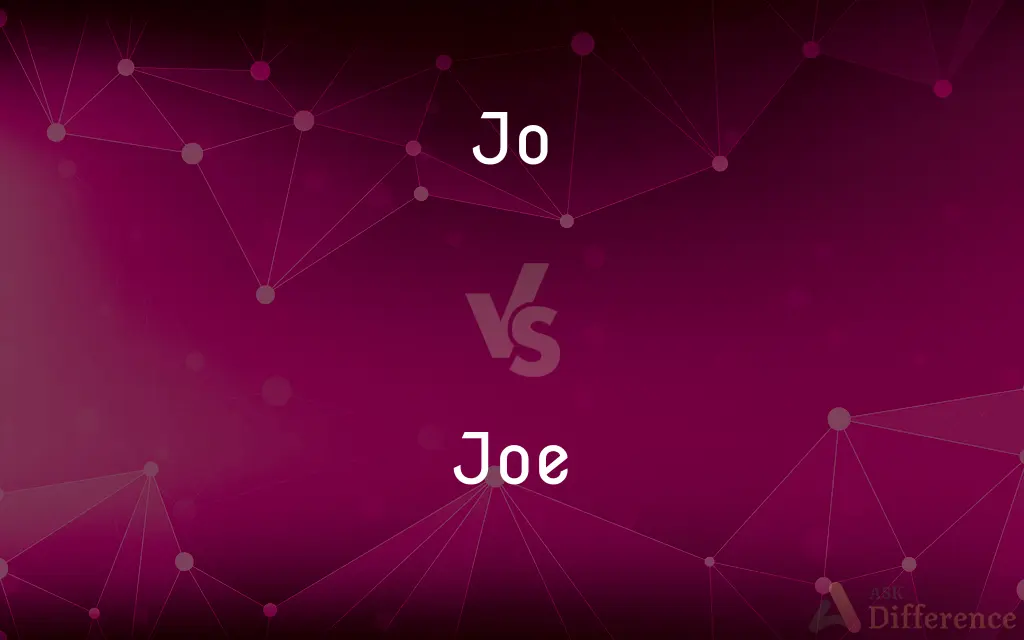Jo vs. Joe — What's the Difference?
By Urooj Arif & Maham Liaqat — Updated on April 6, 2024
"Jo" is a diminutive of names like Joanna or Joanne, often feminine. "Joe" is a common nickname for Joseph, typically masculine.

Difference Between Jo and Joe
Table of Contents
ADVERTISEMENT
Key Differences
"Jo" serves as a diminutive or affectionate form of female names such as Joanna, Joanne, or Jolene. It embodies a sense of familiarity or informality, used among friends, family, or in contexts where a less formal name is preferred. On the other hand, "Joe" is widely recognized as a short form of the male name Joseph. It conveys a similar sense of casualness or affection but within the scope of traditionally masculine names. Both names signify closeness or endearment but are distinguished by the gender associations of the names they represent.
In cultural contexts, "Jo" and "Joe" carry different connotations and are depicted differently in literature, media, and everyday use. "Jo" can evoke images of strong, independent women, partly popularized by characters like Jo March in Louisa May Alcott's "Little Women." Meanwhile, "Joe" often connotes an everyman or the average Joe, embodying the common man's virtues, challenges, and experiences. This distinction underscores how diminutives can reflect societal attitudes towards gender and identity.
Usage of "Jo" and "Joe" can also reflect personal preference or identity, beyond just being casual versions of longer names. Some individuals might choose "Jo" as a professional or personal identity, emphasizing a break from more traditional or formal name use. Conversely, "Joe" might be embraced for its straightforward, friendly vibe, often associated with approachability and reliability. This choice of nickname can therefore play a significant role in how individuals present themselves and are perceived by others.
From a linguistic standpoint, the evolution of diminutives like "Jo" and "Joe" illustrates the flexibility and creativity of language in addressing and identifying individuals. While both serve to shorten and personalize names, they do so within culturally and linguistically defined boundaries of gender. The use of "Jo" for females and "Joe" for males highlights the ongoing interplay between language, identity, and societal norms.
Interestingly, while "Jo" and "Joe" are primarily distinguished by their association with feminine and masculine names, respectively, their phonetic similarity points to the nuanced ways in which language encodes gender. As society's understanding of gender becomes more fluid, the usage of names and nicknames like "Jo" and "Joe" may also evolve, reflecting broader shifts in perceptions of identity and belonging.
ADVERTISEMENT
Comparison Chart
Gender
Female (diminutive of Joanna, Joanne, etc.)
Male (nickname for Joseph)
Connotations
Independent, strong women; informality
Everyman, approachability; informality
Cultural Depictions
Strong female characters (e.g., Jo March)
Common man, "average Joe"
Personal Identity
Preference for informality or identity expression
Emphasizes friendliness, reliability
Linguistic Role
Personalizes and feminizes names
Personalizes and masculinizes names
Compare with Definitions
Jo
Often used in literature to represent strong female characters.
Jo March is a beloved character known for her independence.
Joe
Symbolizes the everyman or average Joe, relatable traits.
Joe's diner aims to be a welcoming place for the common man.
Jo
A short form of feminine names like Joanna or Joanne.
Jo decided to use her nickname on the new book cover.
Joe
A common nickname for the male name Joseph.
Joe signed up for the marathon under his usual nickname.
Jo
Can signify closeness or informality.
Her friends have always called her Jo instead of Joanna.
Joe
Can indicate a casual, unpretentious personality.
Joe's no-frills approach to fashion is part of his charm.
Jo
Can be part of a compound name, emphasizing individuality.
Mary-Jo combines traditional and modern aspects in her name choice.
Joe
Often used to emphasize a friendly and reliable character.
Joe is the go-to guy in the neighborhood for helpful advice.
Jo
Reflects a preference for simplicity and approachability.
On her blog, Jo prefers a casual tone to connect with readers.
Joe
Denotes familiarity and ease in social settings.
Everyone at the office calls him Joe for his easy-going nature.
Jo
A sweetheart.
Joe
Brewed coffee.
Jo
Sweetheart; dear.
Joe
(informal) A male; a guy; a fellow.
I'm just an ordinary joe.
Jo
(Scotland) Darling, sweetheart.
Joe
A spy, especially a double agent.
Jo
The staff used in the Japanese martial art of jodo or jojutsu.
Joe
(historical) johannes
Jo
A sweetheart; a darling.
Joe
Coffee.
Joe
See Johannes.
Common Curiosities
Can "Jo" be used for males?
Traditionally, "Jo" is feminine, but names and their uses can vary based on personal choice.
Is "Joe" always short for Joseph?
While commonly a nickname for Joseph, "Joe" can also stand independently or represent other names.
How do people choose between using "Jo" or "Joe"?
Choice usually depends on the individual's full name, personal preference, and cultural or family traditions.
Are there famous literary characters named Jo?
Yes, Jo March from "Little Women" is a notable example of a strong, independent character named Jo.
What does the name "Joe" imply in American culture?
"Joe" often implies an everyman quality, embodying common virtues and challenges.
Why do people prefer nicknames like "Jo" or "Joe"?
Nicknames can convey familiarity, affection, and informality, making interactions more personal.
Can using "Jo" or "Joe" affect someone's professional image?
Potentially, as names can influence perceptions, but it largely depends on the context and industry norms.
Do "Jo" and "Joe" have different spellings in other languages?
Yes, names and nicknames can vary significantly across languages and cultures.
Can "Jo" and "Joe" be used interchangeably in literature?
Typically not, due to their gender associations, but authors may play with names for stylistic or thematic reasons.
Is it common to meet women named Joe?
It's less common, but names and gender associations can vary and evolve over time.
What are other diminutives similar to "Jo" and "Joe"?
Names like "Bob" from Robert or "Jenny" from Jennifer show similar patterns of diminution and affection.
Are there variations of "Jo" and "Joe" in different cultures?
Yes, many cultures have equivalent diminutives for names, reflecting the universal nature of nicknames.
How do "Jo" and "Joe" reflect societal views on gender?
The traditional gender associations of these names reflect societal norms, but these views are evolving.
Share Your Discovery

Previous Comparison
Adobe vs. Abode
Next Comparison
Satiric vs. SatiricalAuthor Spotlight
Written by
Urooj ArifUrooj is a skilled content writer at Ask Difference, known for her exceptional ability to simplify complex topics into engaging and informative content. With a passion for research and a flair for clear, concise writing, she consistently delivers articles that resonate with our diverse audience.
Co-written by
Maham Liaqat













































